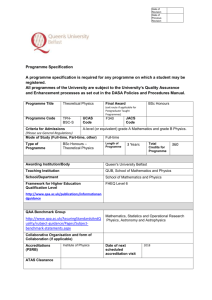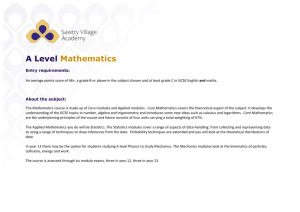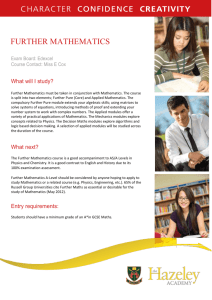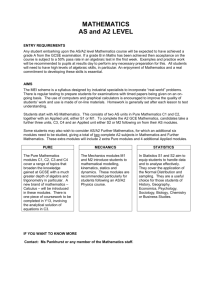MSci Theoretical Physics - Queen`s University Belfast
advertisement
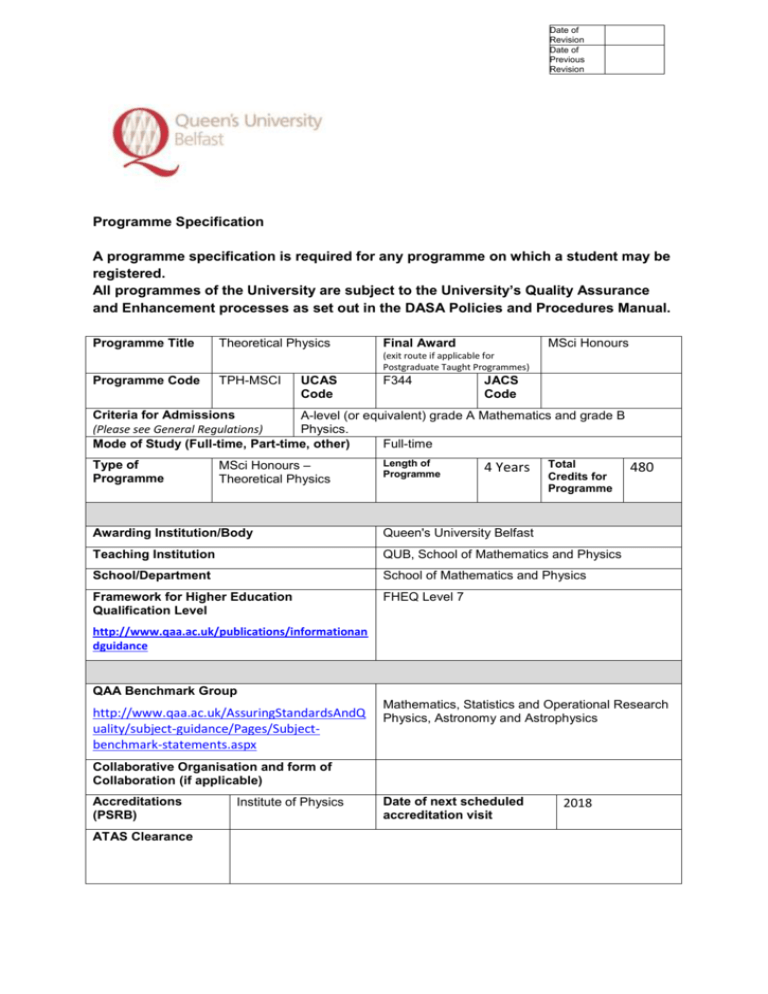
Date of Revision Date of Previous Revision Programme Specification A programme specification is required for any programme on which a student may be registered. All programmes of the University are subject to the University’s Quality Assurance and Enhancement processes as set out in the DASA Policies and Procedures Manual. Programme Title Theoretical Physics Final Award MSci Honours (exit route if applicable for Postgraduate Taught Programmes) Programme Code TPH-MSCI UCAS Code F344 JACS Code Criteria for Admissions A-level (or equivalent) grade A Mathematics and grade B Physics. (Please see General Regulations) Mode of Study (Full-time, Part-time, other) Full-time Type of Programme MSci Honours – Theoretical Physics Length of Programme 4 Years Total Credits for Programme Awarding Institution/Body Queen's University Belfast Teaching Institution QUB, School of Mathematics and Physics School/Department School of Mathematics and Physics Framework for Higher Education Qualification Level FHEQ Level 7 480 http://www.qaa.ac.uk/publications/informationan dguidance QAA Benchmark Group http://www.qaa.ac.uk/AssuringStandardsAndQ uality/subject-guidance/Pages/Subjectbenchmark-statements.aspx Mathematics, Statistics and Operational Research Physics, Astronomy and Astrophysics Collaborative Organisation and form of Collaboration (if applicable) Accreditations (PSRB) ATAS Clearance Institute of Physics Date of next scheduled accreditation visit 2018 External Examiner Name: External Examiner Institution/Organisation Professor G O’Sullivan (Physics) University College Dublin Professor J Fyodorov (Applied Maths) Queen Mary, University of London Does the Programme have any approved exemptions from the University General Regulations Yes (Please see General Regulations) Programme Specific Regulations □ No X (If yes, please state here any exemptions to regulations which have been approved for this programme) Examinations Candidates who have completed an MSci Pathway to the satisfaction of the examiners shall be placed in one of two honours classes, first and second, the second class being in two divisions. When calculating the honours classification the following module weightings are used – Stage 1 Stage 2 Stage 3 Stage 4 5% 15% 30% 5% Students at the end of Stage 4 who do not achieve a 2.2 overall standard may be awarded a BSc degree. The final degree classification is calculated as follows – Stage 1 Stage 2 Stage 3 10% 30% 60% Transfer to Other Pathways At any time, normally up to the end of Stage 2, students may transfer to the BSc Pathway in Theoretical Physics. Students may transfer to other Pathways (BSc, or if they have achieved a weighted average of at least 55%,, MSci), provided they have passed all the compulsory modules on the Pathway to which they are transferring up to that time of transfer. Students with protected characteristics Are students subject to Fitness to Practise Regulations (Please see General Regulations) Length of Programme Progression Stage 1 Students will normally take six modules (or their equivalent) at Level 1 or above. Students must have passed at least five Stage 1 modules in order to progress to Stage 2. Stage 2 Students will normally take six modules (or their equivalent) at Level 2 or above. In order to progress to Stage 3, students must have passed at least five Stage 2 modules, and all six Stage 1 modules, and have achieved an overall average at Stage 2 of at least 55%. Students with an overall average lower than 55% will be required to transfer to the BSc degree. Stage 3 Students will normally take six modules (or their equivalent) at Level 3 or above. Students whose overall average, based on 25% of Stage 2 and 75% of Stage 3 marks, is less than 55% will be required to transfer to the BSc Honours degree. . Please indicate Yes/No Fitness to Practise programmes are those which permit students to enter a profession which is itself subject to Fitness to Practise rules 4 YEARS Stage 3 60% Educational Aims of Programm: To provide a high quality education in mathematics and physics (with an emphasis on the theoretical aspects of physics) for students, which provides opportunities for them to realise their potential in these subjects to the highest possible extent within the timescale available to them for study; To equip them with the necessary base from which to embark on a research degree in mathematical and physical subjects which provides them with opportunities to test their aptitude for and interest in research; To provide opportunities for a balanced and coherent education in mathematics and physics while retaining students' right to choose their modules flexibly according to their aptitudes and interests; To develop students' knowledge and skills base in ways which, inter alia, will enhance their employment opportunities and enable them to make a valuable contribution to society. Learning Outcomes: Cognitive Skills On the completion of this course successful students will have developed their ability to: think logically; analyse problems and situations; choose the appropriate mathematics and/or physics needed for the solution of those problems; carry out structured organisation of their work; learn independently, under guidance; combine their mathematical and physical understanding to develop insights into physical phenomena; work with other students towards a common goal. Learning Outcomes: Transferable Skills On the completion of this course successful students will have developed: skills of analytic thinking and critical analysis; organisational skills and time management; presentational skills, in both written and oral form, of mathematical, graphical and tabular material; the ability to work independently; the ability to meet deadlines. Teaching/Learning Methods and Strategies Methods of Assessment By its nature, mathematics has to be presented logically. The lectures provide exemplars of this process, as do the model answers for the assignments. Applications of theory are discussed in lectures and in problems classes or tutorials, in a manner, which brings out the need to call upon a range of mathematics and physics skills in order to solve a problem. The use of targeted assignments requires students to organise their work, sometimes collaboratively but mostly independently. The assessment of these skills is implicit in all forms of assessment, but for the most part is not explicitly measured. The overall degree of success achieved by each student reflects the extent to which these skills have been acquired. Teaching/Learning Methods and Strategies Methods of Assessment Analytic thinking and critical analysis permeate any study of mathematics and therefore all forms of assessment. Students will only be successful if they plan their own timetables of work, outside formal classes, to maintain a balance between their different modules and between study and other pursuits. Much of their work is done individually, though in one project-based module, team working is encouraged and assessed, and in the physics practical components to modules it is developed and encouraged whilst not being explicitly assessed All students make a series of oral presentations of their project work; the final one, lasting for 30 minutes, is assessed and contributes 20% of the total project mark. Individual feedback on the earlier presentations is provided to give guidance on how to make improvements. Most of the assessment, in examinations as in dissertations, is based on students’ written presentation. Feedback on assignment submission is designed partly to enhance the students’ skills in this area. Learning Outcomes: Knowledge and Understanding On the completion of this course successful students will have developed knowledge and understanding of: basic mathematical methods and techniques of calculus and analysis, algebra, vector methods, numerical methods; the use of these basic techniques in areas of application of mathematics and physics, such as classical mechanics, fluid mechanics, numerical analysis, optics, electricity and magnetism, quantum and statistical mechanics and astronomy; basic principles of physics, including the handling of experimental equipment, the planning of experiments and their analysis; the application of physics and mathematical principles to matter in various forms such as crystals, semiconductors, atoms, nuclei and radiation; a selection of more specialist optional topics in theoretical physics; particular areas related to theoretical physics which would bring the students to the point from which they can embark on research Learning Outcomes: Subject Specific Skills On the completion of this course successful students will have developed a broad range of skills within each of applied mathematics and physics; a high level of numeracy; their ability to construct mathematical proofs and derivations of key physics laws; an ability to construct computer programs in languages such as MATLAB or FORTRAN to aid the solution of mathematically based problems; their ability to formulate situations in mathematical terms, and to express mathematical solutions in the context in which problems were originally posed; an awareness of ways in which both mathematics and phsyics are of importance in the world of work; their ability to undertake a small research project in theoretical physics. Teaching/Learning Methods and Strategies Methods of Assessment Lectures constitute the foundation for the presentation of the knowledge and understanding required of successful students. These are augmented by a range of measures – tutorials, problems classes, practical classes – as appropriate. Model answers to all assignments are made available to students. For the mathematics modules, the assignments typically do not contribute to the assessment: they are part of the learning process rather than the assessment process. In physics, they typically count towards 10% of the final module mark Assessment is mainly through formal examinations, either at the end of each module or in class tests held during the module. In some modules, practical work is assessed. In the context of project work, knowledge and understanding are assessed through the write-up or dissertation, and through verbal presentation of the project work. Assignments, comprising sets of questions relevant to the material recently covered in lectures, and normally set at weekly intervals, form the major vehicle for a student’s learning of the various areas of mathematics. Assignments submitted are marked within one week and returned to the students to provide individual feedback on progress. Teaching/Learning Methods and Strategies Methods of Assessment Mathematical skills are acquired through doing and applying mathematics. While lectures provide a basis for this process, it is the undertaking of the weekly assignments, which is key for developing a breadth and depth of mathematical ability. Physics skills are similarly acquired by doing assignments designed to reinforce material presented through lectures while practical skills are acquired through doing a series of laboratory experiments/projects of increasing difficulty across the broad range of the subject. Confidence is thereby engendered, and this is enhanced through discussion in tutorials and problems classes. Practical classes develop skills in the use of mathematical software and the solution of problems for which an analytic approach does not lead to a full solution. One third of the final year’s workload comprises a research project in either applied mathematics or physics, individually supervised by a researcher from among the academic staff. We link closely with the University Careers Service who provide lectures and workshops involving employers of mathematicians and physicists. Assessment is through formal examinations, practical assignments and project dissertations. Programme Requirements Module Title Module Code Level/ stage Credits Availability S1 Duration Pre-requisite S2 Assessment Core Option Coursework % Examination % Stage 1 Students are required to take the four compulsory modules AMA1001, AMA1002, PHY1011 and PHY1022 together with either PHY1012 and PHY1024 or PMA1012 and PMA1014. Vector Algebra & Dynamics AMA1001 I 20 12 Weeks A-level Maths B Foundation Physics 1 PHY1011 I 20 12 Weeks Computational Methods PHY1012 I 20 12 Weeks Numbers, Sets and Sequences PMA1012 I 20 12 Weeks PHYF011 & PHYF022 or Aphyics (C) & Amaths (C) At least A-level Maths & AS-level Physics or equiv. A-level Maths B Waves and Vector Fields AMA1002 I 20 12 Weeks AMA1001 (corequisite) Foundation Physics 2 PHY1022 I 20 12 Weeks PHY1011 (corequisite) Computational Modelling in Physics PHY1024 I 20 12 Weeks PHY1012 (corequisite) Analysis and Linear Algebra PMA1014 I 20 12 Weeks A-level Maths B PMA1012 (corequisite) 10 90 30 70 100 100 20 80 30 70 100 100 Module Title Module Code Level/ stage Credits Availability S1 Duration Pre-requisite S2 Assessment Core Option Coursework % Examination % Stage 2 Students must take an approved combination of Level 2 modules chosen from the table below and of total weight 120 CAT Credits. The choice must include at least 40 CAT Credits in each of Applied Mathematics and Physics. Students should take note of pre-requisites for Level 3 and Level 4 modules before finalising their choices of Level 2 modules. AMA2001, AMA2003, PHY2081, PHY2082 and PHY2084 are compulsory. Classical Mechanics AMA2001 II 20 12 Weeks AMA1001 and AMA1002 Methods of Applied Mathematics AMA2003 II 20 12 Weeks None Modern Physics PHY2081 II 20 12 Weeks PHY1011 and PHY1022 Astronomy PHY2083 II 20 12 Weeks PHY1011 and PHY1022 Numerical Analysis AMA2004 II 20 12 Weeks None Fluid Mechanics AMA2005 II 20 12 Weeks AMA1002 Physics of the Solid State PHY2082 II 20 12 Weeks PHY1011 and PHY1022 Optics, Electricity and Magnetism PHY2084 II 20 12 Weeks PHY1011 and PHY1022 Atoms, Nuclei and Radiation PHY2085 II 20 12 Weeks PHY1011 and PHY1022 100 100 30 70 30 70 40 60 100 30 70 30 70 30 70 Module Title Module Code Level/ stage Availability S1 Duration Pre-requisite S2 Assessment Core Option Coursework % Examination % Stage 3 Students must take an approved combination of six Level 3 modules normally chosen from the list below. AMA3001, AMA3002, AMA3003, AMA3013 and AMA4020 are compulsory. Students should take note of pre-requisites for Level 4 modules before finalising their choice of Level 3 modules Electromagnetic Theory AMA3001 III 20 12 Weeks None Quantum Theory AMA3002 III 20 12 Weeks None Advanced Numerical Analysis AMA3004 III 20 12 Weeks AMA2004 Partial Differential Equations AMA3006 III 20 12 Weeks None Solid State Physics PHY3012 III 20 12 Weeks PHY2082 Tensor Field Theory AMA3003 III 20 12 Weeks None Calculus of Variations & Hamiltonian Mechanics AMA3013 III 20 12 Weeks None Astrophysics PHY3023 III 20 12 Weeks None Investigations AMA4020 III 20 12 Weeks None 100 100 30 70 100 30 70 100 100 30 100 70 Module Title Module Code Level/ stage Availability S1 Duration Pre-requisite S2 Assessment Core Option Coursework % Examination % Stage 4 Students must take an approved combination of modules of total weight 120 CAT Credits. These modules must be chosen from the list below except one of the elective modules in the list may be substituted by a Level 3 module, from the above list, not previously taken. AMA4001, AMA4004 and AMA4005 are compulsory. Advanced Quantum Theory AMA4001 IV 20 12 Weeks AMA3002 or PHY3011 Practical Methods for Partial Differential Equations AMA4006 IV 20 12 Weeks None Astrophysics PHY4012 IV 20 12 Weeks PHY3023 Condensed matter and materials science PHY4024 IV 20 12 Weeks PHY3012 Advanced Mathematical Methods AMA4003 IV 20 12 Weeks None Statistical Mechanics AMA4004 IV 20 12 Weeks AMA3002 or PHY3011 Mathematical Methods for Quantum Information Processing Information Theory AMA4021 IV 20 12 Weeks AMA2003 or PMA2007 AMA4009 IV 20 12 Weeks None Project AMA4005 IV 20 24 Weeks None 100 25 75 10 90 10 90 100 100 100 100 100 Approved by Director of Education: Print Name: …………………………………………………….. Signature: ………………………………………… Date: ……………………………..

